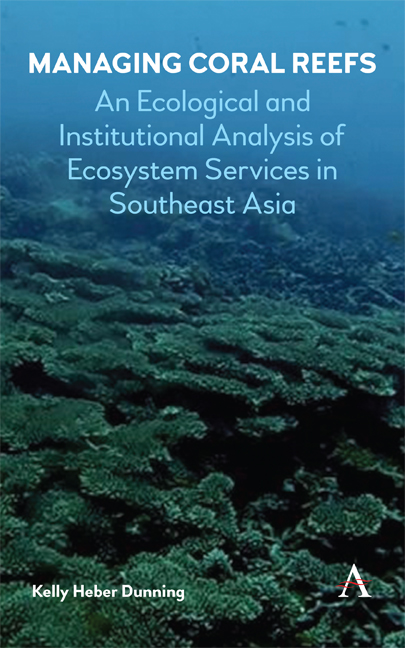 Managing Coral Reefs
Managing Coral Reefs Book contents
- Frontmatter
- Contents
- List of Figures
- List of Tables
- Acknowledgments
- List of Abbreviations
- 1 Introduction
- 2 Theory, Practice and Policy Context of Coral Reef Management
- 3 Governing Natural Resources in Indonesia and Malaysia
- 4 Case Study Sites and the Coral Triangle
- 5 Integrated Management of Marine Protected Areas
- 6 Legitimate Marine Protected Areas
- 7 Adaptive Capacity of Marine Protected Areas
- 8 Policy Recommendations for Marine Protected Area Management in Developing Countries
- Appendix A Research Design
- Appendix B Data and Methods
- Appendix C Coral Cover Results
- References
- Index
5 - Integrated Management of Marine Protected Areas
Published online by Cambridge University Press: 16 August 2018
- Frontmatter
- Contents
- List of Figures
- List of Tables
- Acknowledgments
- List of Abbreviations
- 1 Introduction
- 2 Theory, Practice and Policy Context of Coral Reef Management
- 3 Governing Natural Resources in Indonesia and Malaysia
- 4 Case Study Sites and the Coral Triangle
- 5 Integrated Management of Marine Protected Areas
- 6 Legitimate Marine Protected Areas
- 7 Adaptive Capacity of Marine Protected Areas
- 8 Policy Recommendations for Marine Protected Area Management in Developing Countries
- Appendix A Research Design
- Appendix B Data and Methods
- Appendix C Coral Cover Results
- References
- Index
Summary
Overview
The following chapters examine the social differences between Indonesian and Malaysian reef management contexts. These differences fall into three categories: integrated management of the social and ecological system, legitimacy and adaptive capacity. In the next three chapters, I will build a foundation for my conclusion that Indonesian reef management institutions, because they do integrated management better, have more legitimacy, and afford their stakeholders greater capacity for adaptive management are better suited to managing reefs in the Southeast Asian context.
Although there were no findings of statistically different levels of coral cover in this research between Indonesia and Malaysia, stakeholder perceptions varied significantly between top-down-managed marine parks in Malaysia and co-managed sites in Bali, Indonesia.
This chapter discusses the different perceptions among marine protected areas (MPAs) stakeholders in Indonesia and Malaysia on integrated management. Integrated management occurs when management institutions create rules for access and extraction of an ecosystem that consider economic activity (such as fishing or building new hotels on the coast) alongside ecological quality indicators that indicate the health of the reef. Integrated management has three parts: balancing between stakeholder groups; limitations where some stakeholders “win” and some “lose,” but with strategies to help those who lose transition into new livelihoods; and what I call “steam releases” where some rule breaking can occur by a very small amount of people or in a very limited scale.
To better illustrate this concept, I offer two hypothetical cases of reef management institutions, Case A and Case B. In Case A, there is integrated management. Leaders in the MPA make rules that limit the most ecologically damaging activities to the reef with a careful balancing act in mind. This balancing seeks to prevent all out unemployment of fishermen, while also preserving the health of the reef. For instance, they ban destructive fishing and the use of highly damaging methods such as trawling, while still allowing fishing with nets as well as line and pole 12 kilometers offshore from the reef. Fishing was not banned, but in order to protect the reef and ensure that functional groups that are critical to reef health are not overfished, fishing was moved further offshore and certain gear types were banned.
- Type
- Chapter
- Information
- Managing Coral ReefsAn Ecological and Institutional Analysis of Ecosystem Services in Southeast Asia, pp. 65 - 88Publisher: Anthem PressPrint publication year: 2018


